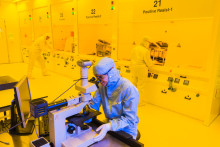During the discussion-meeting 'Night of Science and Society' three secretaries received the manifesto: Hermans (Education, Culture and Sciences), Jorritsma (Economic Affairs) and Brinkhorst (Agriculture). Hermans responded positively to the initiative that, according the press officer should principally be seen as an appeal to the next cabinet. 'The same amount of 200 million was also mentioned in the Memo for the Future on Education and Research presented by the cabinet end of August.'
The Society for Universities VSNU, the scientific academy KNAW, research financier NWO and research institute TNO write in the memo that the 200 million is necessary to make sure that the Netherlands will not fall behind other European countries and the United States. Otherwise nothing will come of the explicitly stated ambition to make the Dutch knowledge economy belong to the world top.
Not surprising is the supposition of the organisations themselves that level and organisation of Dutch research at the moment are good. But the size in absolute terms is according to them not that great. Moreover, the level of investments lags behind the United States and other European countries. Striking is that the amount requested is 50 million below that requested by NWO-chairman at the beginning of August, for the 'run-down house' of Dutch research.
Nevertheless, the extra money is considered to be the 'first step towards strengthening the Dutch knowledge economy' by the organisations. This should, moreover, lead to an attractive work climate for young researchers and a good atmosphere for the few students in sciences. Investments are especially necessary in areas 'where developments take place at an enormous rate, like genomics, nanotechnology, ecology, neurosciences, and ICT'.
The manifesto of the five organisations is carefully timed for the maximum political effect. Parliament is at the moment discussing the budgets of a number of departments and in the coming months all major political parties are determining their election programmes for the parliamentary elections in May 2002.
The manifesto, therefore, tries to give substantial arguments to support the claim for more money. 'The effect of publicly funded research on the productivity is positive and outweighs its costs', theauthors write with references to recent research by the OECD, the international organisation for economic co-operation and development.







